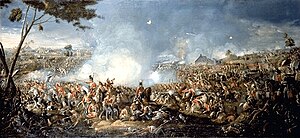Dutch Empire/Under the French
In 1810 the Kingdom of Holland was dissolved by Napoleon. The 1812 campaign in Russia proved to be calamitous for Napoleon, but it was a complete disaster for the Dutch army. Of the 20,000+ Dutch soldiers serving in Russia, only a few hundred returned home (most had served with the rearguard at the Beresina). As Russian troops crossed the Dutch borders in 1813, a full-scale rebellion against the French broke out and the son of William V (who had since died), Willam Frederik, returned and became Willam I of a new Kingdom of the Netherlands. He went to The Hague to be granted the title Sovereign of The Netherlands on 2 December 1813.

When Napoleon returned for the 100 Days, Dutch troops were sent to the front under control of William Frederick George Louis, future King of the Netherlands. During the Congress of Vienna, King William I successfully won the peace and completed his dream of a United Netherlands by uniting the Southern Netherlands in the Kingdom. Java and Dutch Guiana (Suriname) were both returned to the Dutch, but Berbice, today Guyana, was ceded to Britain.
